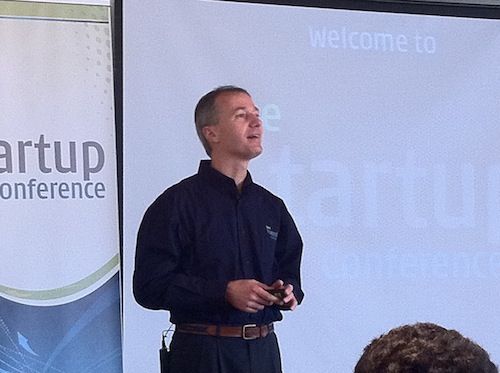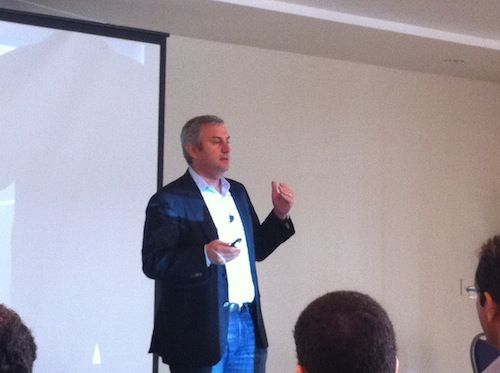The Startup Conference LA kicked-off this morning with opening remarks by Alain Raynaud, the Director of the Founder Institute in Paris and the organizer of the event. Alain has deep roots in the startup community having been a co-founder of three different companies and taking the stage to pitch at TechCrunch Disrupt in 2008.

Alain has a ton of experience working with founders and outlined five mistakes startups make when building an initial team:
1. Lining-up a great team but not having a developer
2. One person being full time the rest part-time – it’s okay to have a startup with everyone being part time, but if one person moves to full time this can create an imbalance.
3. Not deciding who the CEO is
4. Splitting equally – one of the biggest mistakes startups can make is splitting the equity equally.
5. Not sharing their idea – people don’t copy ideas, they copy success.
Alain wrote an equity calculator that founders can use to determine how to best split-up equity in the company which you can use for free at foundrs.com/calculator.
Next up was Mark Suster from GRP Partners to give the keynote. Mark sold his company to Salesforce.com in 2007 and currently invests in early-stage technology companies.

Mark started his talk by discussing “wantrepreneurs”, everyone wants to start a company, but so many people never get started. You need to get started, be passionate about what you do, and do it for the right reasons. You no longer need to wait, if you are waiting you might not be an entrepreneur.
Most people will fail, most people will lose money being an entrepreneur, but if it’s in your blood then it might be the right fit. It has never been easier to start a business now thanks to cloud computing.
When starting a company it’s important not to have too many co-founders. In many cases starting a business means spending under $2,000 putting-togethe a business plan, forming the company, creating a website, a logo, etc. and then finding co-founders.
When dealing with founders it’s important to understand that people fall-out of love, lives change, etc. Companies should have a document that says any work done belongs to the company. This way if someone drops-out of the company they don’t take their IP with them – this IP belongs to the company.
Raising Money – avoid the three F’s; friends, family, and fools. Start with someone from your industry, and avoid someone that wants to see results right-away. Investors should realize that they probably won’t make much money, that’s the startup game. Helpful tech professionals and wealthy entrepreneurs could be a good fit and might be even more understanding of the path your business will take. Doctors, Dentists, Lawyers, etc. should be low on the list of investors since they probably don’t understand your business or have realistic expectations.
You need an anchor angel investor to advise you and potentially become your first investor. There are ways you can give some good incentives to the angel. At the end of the day, if you can’t get an intro to a VC, hang-up your cleats now. Tools like Social Media make it easier than ever before to connect with VC’s so there are no excuses.
You should be having regular coffee meetings with people, at least once a week but shoot for five times a week if you can. These can be less than an hour long but you can learn a lot and over time, things will happen.
VC’s want Management, market size, money, and momentum. Update VC’s all the time, let them know what you’re doing, progress made, make them see that you are as happening as you say you are. Create a sense of urgency, you should make people feel like they are going to miss-out on something if they don’t make a move. Fear of missing-out drives most deals.
When raising money shoot for between 18-24 months of runway. This is the expectation VC’s will have and will allow you to focus on the business without having to raise money again before making more traction. Don’t forget to learn from your competition and don’t discount them.
Skate where the puck is going – if you read about it on TechCrunch, you’re too late. Be realistic with yourself, there is nothing glamorous about startups, it’s a grind.



